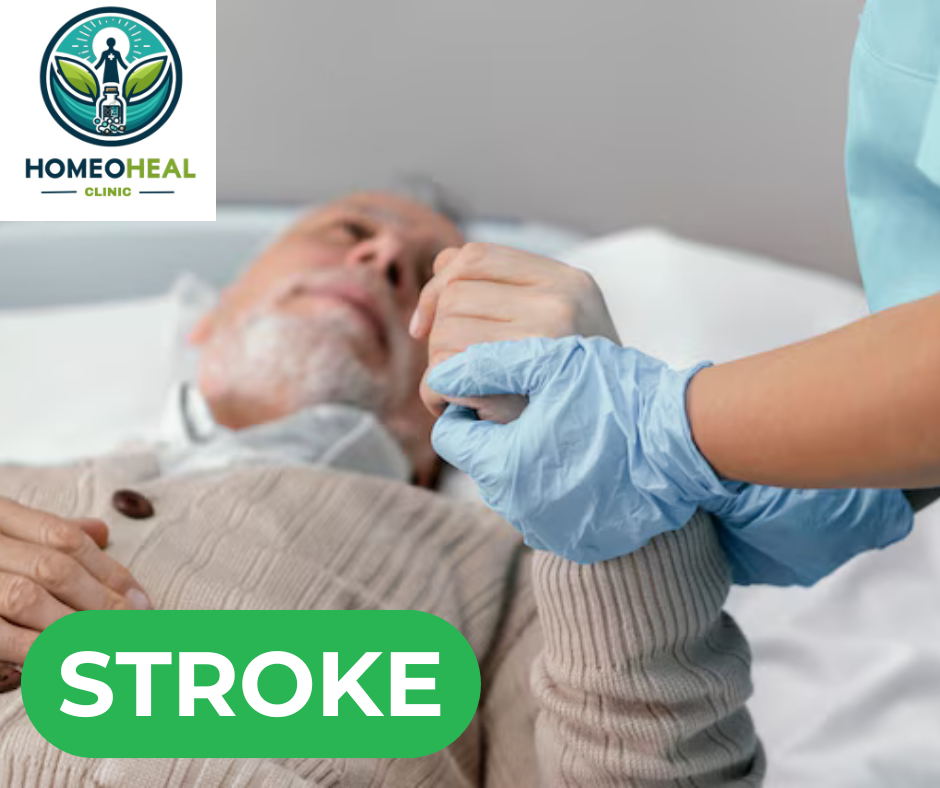|| By the desk of Dr. Nikhat Choudhary ||
Introduction
Having been a healthcare professional myself, I have witnessed the stroke-induced calamities of the individuals as well as their families. In this article, I will throw light on stroke and its broad worldwide and Indian epidemiology, components, symptoms, and complications. Furthermore, I will exhibit various advantages of homeopathy in stroke management and the likely unfavorable effects of conventional treatments
World Epidemiology
Stroke is, indeed, a major horror around the world. Based on the »statistics World Health Organization has compiled,» Reportedly, about 15 million people all over the world get suffered by stroke every year. Additionally, close to 5 million die, and some 5 million people become permanently disabled. Stroke is the second most common worldwide killer, and it is also a cause of disability.
Indian Epidemiology
In the Indian subcontinent, the conditions of stroke are getting more and more unfavourable in terms of health. The Indian Council of Medical Research claimed that the stroke rate in India was 84-262 per AI00,OOO population in rural areas and 334-424 per 100,000 population in urban areas. The incidence rate is 119-145 per 100,000 populations.
Causes
Stroke is a result of the lack of blood supply to a part of the brain that results in a part of the brain becoming deprived of the required oxygen and nourishment. The main causes are as follows:
Ischemic stroke: Because a blood clot clogs a blood vessel in the brain
Hemorrhagic stroke: Babe loses her umbilical cord and the blood flow in the kids brain is disrupted
Transient ischemic attack (TIA): A ghostly appearance of a short-duration loss of blood to the brain.
Symptoms
The usual indications of a stroke include:
Sudden numbness or the weakness of the face, arm, or leg, especially if it is on one side of the body
Abrupt confusion, trouble speaking, or difficulty in the understanding of a conversation
An out-of-the-blue situation of either or both eyes that went blind
The inability to walk, dizziness, the loss of balance, or the lack of coordination suddenly occurred
Sudden and severe headache with a known origin
Complications
Strokes may lead to many complications. For example:
Paralysis or loss of muscle movement
Trouble with speaking and swallowing
Symptoms of memory loss or trouble of thinking
Emotional problems
Pain or numbness in some body parts
Side Effects of Conventional Treatment
Even though traditional treatments for stroke might be life-saving, they could, however, also have side effects. Here are some examples:
The use of blood thinners can result in bleeding
The use of the tissue plasminogen activator (tPA) can cause the bleeding in the brain
Surgery may lead to additional infection, bleeding or pain
Patients may suffer from nausea, dizziness, or allergic reactions
Benefits of Homeopathy
On the other hand, supplementation with homeopathy as an approach offers several potential attractions as far as the management of strokes is concerned. Specifically, the
Homeopathy treatment of patients is done by looking individually at the symptoms as well as the constitution of a particular patient
Possibly minimized side effects compared to the standard medications are the big ones
Might as well improve overall well-being and bring quality to life as some of the advantages
These medications can be used in combination with the classical medications to endorse recovery
You can choose to make use of the same to manage the complications and symptoms that come after the attack.
5 Homeopathic Medicines for Stroke
Arnica Montana: One of the most common medications used just after a stroke to reduce the extent of the wound and to promote healing.
Gelsemium: May be of help in case of paralysis and lack of appetite, particularly if you also feel dizzy and trembling.
Nux Vomica: Can help the patient having a paralysis feeling, nausea, dizziness, and sensitivity to light and noise.
Causticum: Commonly prescribed for paralysis, mainly on the right side, accompanied by speaking and swallowing problems.
Phosphorus: It might help stroke patients who feel confused, dizzy, and numbness in the extremities.
5 Common FAQs about Homeopathy for Stroke
Q: Can homeopathy prevent strokes?
A:Yes, it shall help the people in the management of their risk factors namely high blood pressure and stress, if ever, thus, reducing the risk of having a stroke.
Q: Is homeopathy safe to use alongside conventional stroke treatments?
A: Yes, with homeopathy, additional support can sometimes come in the form of a complimentary therapy, which is generally safe alongside conventional options. However, disclose to your doctor any of the treatments you're taking.
Q: How long does it take to see results with homeopathic treatment for stroke recovery?
A: It is not possible to give an exact figure. The time periods differ from one person to another. It is the possibility that some patients experience positive changes within a few weeks, and it might take months for others. Their influence would be both consistency and patience.
Q: Can homeopathy help with post-stroke complications?
A: Yes, homeopathic recipes can be tailored to address specific post-stroke complications such as speech difficulties, paralysis, or emotional issues.
Q: What are the main benefits of using homeopathy for stroke recovery?
A: One of the most important aspects of homeopathy is that it is a personalized treatment with a minimum amount of side effects, and, therefore, it is possible that a sick person will improve in more ways, develop better physical treatments, addressing at the same time emotional issues of recovery.
